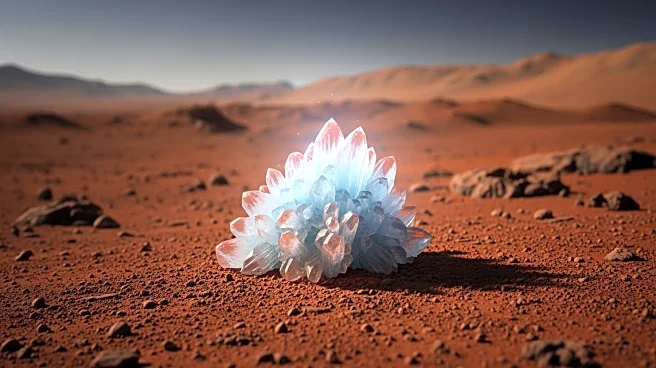What's Happening?
The European Space Agency (ESA) has released new images from the Mars Express mission, revealing evidence of a previous ice age on Mars. The images focus on the Coloe Fossae region, which is marked by deep valleys, speckled craters, and signs of glacial
activity. These features, known as lineated valley fill and concentric crater fill, suggest that icy debris once flowed across Mars's surface, similar to glaciers on Earth. The patterns indicate that Mars has undergone alternating periods of warm and cold climates, driven by changes in the tilt of its axis. The ESA's High Resolution Stereo Camera captured these images, providing insights into the Red Planet's climatic history.
Why It's Important?
Understanding Mars's climatic history is crucial for future exploration and potential colonization efforts. The evidence of past ice ages on Mars suggests that the planet has experienced significant climate shifts, which could impact the feasibility of sustaining human life. These findings also contribute to the broader understanding of planetary science, offering comparisons to Earth's own ice ages. The data could inform strategies for resource utilization, such as water extraction from ice deposits, which is vital for long-term missions. Additionally, the study of Mars's climate history may provide insights into the planet's geological evolution and its potential for harboring life.
What's Next?
The ESA plans to continue analyzing the data from the Mars Express mission to further understand the implications of these findings. Future missions may focus on exploring other regions of Mars that show signs of past glacial activity. Scientists will likely investigate the potential for water ice deposits, which could be crucial for future manned missions. The ongoing research may also involve collaboration with other space agencies to develop comprehensive models of Mars's climate history. These efforts aim to prepare for eventual human exploration and settlement on Mars, leveraging the knowledge gained from these studies.
Beyond the Headlines
The discovery of ancient ice ages on Mars raises questions about the planet's ability to support life in the past. The presence of water ice suggests that Mars may have had conditions suitable for life at some point. This possibility fuels ongoing debates about the existence of microbial life on Mars and the planet's habitability. The findings also highlight the importance of international collaboration in space exploration, as understanding Mars's climate history requires a multidisciplinary approach. The data from Mars Express contributes to the global effort to explore and understand our solar system, paving the way for future discoveries.















